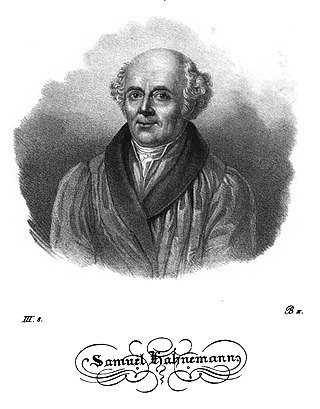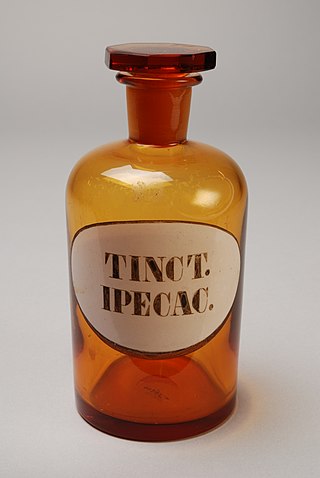
Homeopathy or homoeopathy is a pseudoscientific system of alternative medicine. It was conceived in 1796 by the German physician Samuel Hahnemann. Its practitioners, called homeopaths or homeopathic physicians, believe that a substance that causes symptoms of a disease in healthy people can cure similar symptoms in sick people; this doctrine is called similia similibus curentur, or "like cures like". Homeopathic preparations are termed remedies and are made using homeopathic dilution. In this process, the selected substance is repeatedly diluted until the final product is chemically indistinguishable from the diluent. Often not even a single molecule of the original substance can be expected to remain in the product. Between each dilution homeopaths may hit and/or shake the product, claiming this makes the diluent "remember" the original substance after its removal. Practitioners claim that such preparations, upon oral intake, can treat or cure disease.

Toxicology is a scientific discipline, overlapping with biology, chemistry, pharmacology, and medicine, that involves the study of the adverse effects of chemical substances on living organisms and the practice of diagnosing and treating exposures to toxins and toxicants. The relationship between dose and its effects on the exposed organism is of high significance in toxicology. Factors that influence chemical toxicity include the dosage, duration of exposure, route of exposure, species, age, sex, and environment. Toxicologists are experts on poisons and poisoning. There is a movement for evidence-based toxicology as part of the larger movement towards evidence-based practices. Toxicology is currently contributing to the field of cancer research, since some toxins can be used as drugs for killing tumor cells. One prime example of this is ribosome-inactivating proteins, tested in the treatment of leukemia.

Ibuprofen is a nonsteroidal anti-inflammatory drug (NSAID) that is used to relieve pain, fever, and inflammation. This includes painful menstrual periods, migraines, and rheumatoid arthritis. It may also be used to close a patent ductus arteriosus in a premature baby. It can be used orally or intravenously. It typically begins working within an hour.

Syrup of ipecac, or simply ipecac, is a drug that was once widely used as an expectorant and a rapid-acting emetic. It is obtained from the dried rhizome and roots of the ipecacuanha plant, from which it derives its name. It is no longer regularly used in medicine.

Chelation therapy is a medical procedure that involves the administration of chelating agents to remove heavy metals from the body. Chelation therapy has a long history of use in clinical toxicology and remains in use for some very specific medical treatments, although it is administered under very careful medical supervision due to various inherent risks, including the mobilization of mercury and other metals through the brain and other parts of the body by the use of weak chelating agents that unbind with metals before elimination, exacerbating existing damage. To avoid mobilization, some practitioners of chelation use strong chelators, such as selenium, taken at low doses over a long period of time.

Tetryzoline (INN), also known as tetrahydrozoline, is a drug used in some over-the-counter eye drops and nasal sprays. Tetryzoline was patented in 1954, and came into medical use in 1959.

Mitragyna speciosa is a tropical evergreen tree in the coffee family native to Southeast Asia. It is indigenous to Cambodia, Thailand, Indonesia, Malaysia, Myanmar, and Papua New Guinea, where it has been used in herbal medicine since at least the 19th century. It has also historically been consumed via chewing, smoking, and as a tea. Kratom has opioid-like properties and some stimulant-like effects.
Poppers is a slang term referring to recreational drugs belonging to the alkyl nitrite family of chemical compounds. When fumes from these substances are inhaled, they act as potent vasodilators, producing mild euphoria, warmth, and dizziness. Most effects have a rapid onset and are short-acting. Its recreational use is believed to be potentially dangerous for people with heart problems, anaemia and glaucoma. Reported adverse effects include fainting, retinal toxicity and vision loss.
A poison control center is a medical service that is able to provide immediate, free, and expert treatment advice and assistance over the telephone in case of exposure to poisonous or hazardous substances. Poison control centers answer questions about potential poisons in addition to providing treatment management advice about household products, medicines, pesticides, plants, bites and stings, food poisoning, and fumes. In the US, more than 72% of poison exposure cases are managed by phone, greatly reducing the need for costly emergency department and doctor visits.
The American College of Medical Toxicology is a professional association of medical toxicologists that was founded in 1993. Its aim is to support quality medical care for persons exposed to potentially harmful chemicals, and to provide training and insight to the physicians who provide this care.
Ethylene glycol poisoning is poisoning caused by drinking ethylene glycol. Early symptoms include intoxication, vomiting and abdominal pain. Later symptoms may include a decreased level of consciousness, headache, and seizures. Long term outcomes may include kidney failure and brain damage. Toxicity and death may occur after drinking even in a small amount as ethylene glycol is more toxic than other diols.

Benzodiazepine overdose describes the ingestion of one of the drugs in the benzodiazepine class in quantities greater than are recommended or generally practiced. The most common symptoms of overdose include central nervous system (CNS) depression, impaired balance, ataxia, and slurred speech. Severe symptoms include coma and respiratory depression. Supportive care is the mainstay of treatment of benzodiazepine overdose. There is an antidote, flumazenil, but its use is controversial.
Translational research is research aimed at translating (converting) results in basic research into results that directly benefit humans. The term is used in science and technology, especially in biology and medical science. As such, translational research forms a subset of applied research.

The University of Florida's (UF) online clinical toxicology distance education programs cater to working professionals, including physicians, nurses, physician assistants, first responders, and poison control center professionals. The programs focus on toxicants, drugs of abuse, drug analysis, and biotransformation, as well as the treatment of poisoned or overdosed patients. Classes are taught by internationally recognized faculty with expertise in clinical toxicology, medicine, pharmacy, and pharmacology.

Jeffrey A. Brent is a medical toxicologist who is a distinguished clinical professor of medicine and emergency medicine at the University of Colorado, School of Medicine. In addition, he is a professor at the Department of Environmental and Occupational Health at the Colorado School of Public Health. He is also the past president of the American Academy of Clinical Toxicology, was editor in chief of the journal Toxicological Reviews, and was a member of the board of directors of the American College of Medical Toxicology. Previously, most of Brent's research focused on the use of fomepizole as a treatment for both methanol and ethylene glycol poisoning, and he led a trial of this drug which resulted in the FDA approving it in December 1997. Currently, Brent serves as Director of the Toxicology Investigators Consortium, an NIH and FDA supported multi center research and surveillance group. Brent is also a senior editor of "Critical Care Toxicology: Diagnosis and Management of the Critically Poisoned Patient," originally published in 2005, and now in its second edition, which was published in 2017.

Poisoning is the harmful effect which occurs when toxic substances are introduced into the body. The term "poisoning" is a derivative of poison, a term describing any chemical substance that may harm or kill a living organism upon ingestion. Poisoning can be brought on by swallowing, inhaling, injecting or absorbing toxins through the skin. Toxicology is the practice and study of symptoms, mechanisms, diagnoses, and treatments correlated to poisoning.

Steven A. Seifert (1950–2022) was an American medical toxicologist. He was a professor of emergency medicine at the University of New Mexico, as well as the medical director of the New Mexico Poison and Drug Information Center. Since 2017, he was the editor-in-chief of Clinical Toxicology. He was also a jazz tenor saxophonist.
Omid Farokhzad is an Iranian-American physician, scientist, and entrepreneur in the development of nanomedicines. Farokhzad is a Professor of Anesthesiology at Harvard Medical School. Omid Farokhzad is the Chair, Chief Executive Officer and co-founder for Seer, a company focused on deep, unbiased proteomics analysis at scale. The Boston Globe selected him among the top innovators in Massachusetts and the Boston Business Journal selected him among the Health Care Champions for his innovations.
Barry H. Rumack is an American medical toxicologist and pediatrician. His primary clinical and research interest has been in clinical toxicology with a special interest in acetaminophen poisoning. Since 2014 he is emeritus professor of emergency medicine and pediatrics at the University of Colorado School of Medicine.
The American Board of Applied Toxicology (ABAT) was established in 1985 as a standing committee by the American Academy of Clinical Toxicology. The board functions to recognize and credential clinical toxicologists who have demonstrated competence in the management of toxicity related to poisoning, overdose, chemical exposure, envenomation, or environmental exposures. Candidates for board certification are health professionals with minimum perquisite experience in poisoning and overdose management as well as satisfactory experience in other core areas such as toxicology research, public health, and outreach. The ABAT establishes minimum competency for clinical toxicologists via administering examinations and maintaining certification renewal of diplomates. Successfully passing the ABAT board certification exam provides the taker a designation of Diplomate of the American Board of Applied Toxicology (DABAT). A DABAT designation privileges the clinical toxicologist to provide medical back up and consultation on poisoning, drug overdoses, or toxicity, often via poison centers. The DABAT designation also has legal implication in allowing credentialed toxicologists to manage a poison center in the United States. Credentialed DABAT members must recertify every 5 years via an application demonstrating continued competence and activity in clinical toxicology.











